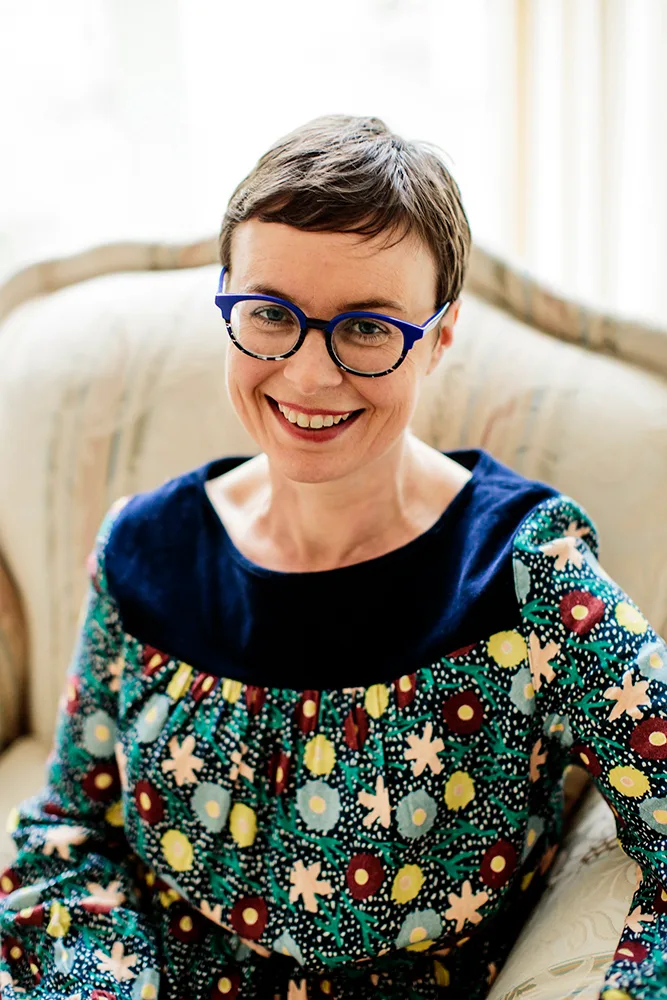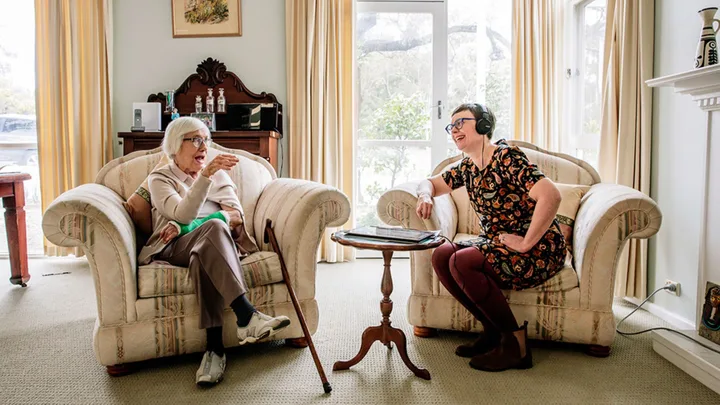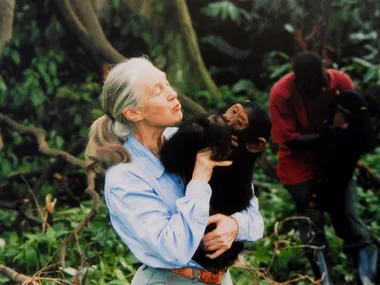On a cool, cloudless morning, 72-year-old Linda Lidbury sat down in her living room to tell her story. Cradling a cup of tea, surrounded by a lifetime of memories, she spoke of growing up in the Australian outback, and of leaving the Red Centre behind to travel overseas before settling down. She laughed when reminiscing about her days as an aerobics instructor in the ’80s. One thing she didn’t speak of was the cancer that would soon take her life.
“Mum was diagnosed with cancer in April 2020,” explains Linda’s daughter, Carla. “She was pretty much told there was nothing they could do for her because they didn’t know the primary source of the cancer, but the oncologist said that if she wanted to try chemotherapy, she could.
“She said, ‘Well, I’m not going to go without a fight’, which is her to a tee. She was a strong woman.”
While the odds were slim, Linda started treatment. “We held onto that tiny bit of hope that the chemotherapy would work.” That she’d beat the cancer – something she’d done decades before.
“In the early 2000s, Mum had stage four melanoma and she beat it, which was amazing,” Carla says.

With past success proving it was possible, hopes were high. But doctors advised the family to prepare for the worst. “The odds were against us.”
The prospect of life without her mum felt illogical to Carla – like she was losing her best friend, her roadmap for life. “When someone dies, so much goes with them – so many stories, so much knowledge.” Carla felt a visceral need to preserve her mum’s life, realising that “once she’s gone, her stories are gone with her – stories I didn’t want to lose”.
Carla and Linda engaged A Lasting Tale, a professional audio service designed to capture a loved one’s life story. Its founder, Dimity Brassil, says it’s true, the first thing you forget is the sound of your loved one’s voice, so it’s important to capture that.
“We all have that feeling sometime in our lives, where you just want to hear someone’s voice again,” she says, speaking from experience.
Dimity’s father and sister died mere months apart. Listening to podcasts, Dimity realised that “I could access the stories and the life lessons, the wisdom, of somebody who was famous, but I could no longer hear the wisdom of my own father and sister”. This realisation was the catalyst for A Lasting Tale.
A couple of weeks after her diagnosis, Linda sat across from Dimity and had a conversation abouther life, sharing memories that would remain with her family long after she took her last breath. A few months later, the cancer took her life. Yet in a bittersweet way, the story of her life remained.
“After listening to it for the first time, it made me realise she was more than just my mum,” explains Carla. “She was a person with dreams, just like any other.”
Each time Carla listens to her mum’s story, she takes away something new. Distant memories are sparked, like going to work with her when she taught aerobics at the local gym.
“I can remember being five years old or so. Mum was teaching a class and I pulled out one of the big mats and I just fell asleep on it while they were all jumping around to loud music,” Carla recalls with a laugh.
“When I listen, I smile, I laugh, I cry. I talk back to her sometimes, but mostly I sit and listen in wonder.” Above all, the recording gives her a sense of comfort. “The comfort of knowing it’s there whenever I want to listen to her voice … It’s the most valuable thing I own now.”

Stories of motherhood
In death, the ordinary has a way of becoming the extraordinary, like the voice of a loved one you heard almost every day of your life, a song on the radio, or a scent carried on the breeze. In this way life and death are threaded as one – our stories the stitching that binds us.
For mother-of-two Adelle Rutch, stories are entrenched in motherhood. When her children were born, her mother gave her a handmade book for each – keepsakes in which Adelle could write to her children about motherhood, the good days and the bad, and lessons learned along the way.
Sometime during her first year as a mum, Adelle wrote her daughter’s birth story. A birthday letter followed, a celebration of her child’s first year on Earth, and her first as a mum.
It’s a tradition she’s kept throughout the years.
“On the eve of their birthday, I’ll write them a letter celebrating the year that’s been, the year we’ve had together,” she says. “I write about what I’ve been doing as a mum and how I’ve been fostering their interests. I hope it’s a keepsake they can reflect back on – an insight into me as a mum and their journey as a child.”
Yet Adelle’s reasons for writing to her children stretch beyond a keepsake. In the beginning, the ritual allowed her to reflect on and process becoming a mother – the sticky parts where many of us stumble and parts deemed rudimentary or innate, which often aren’t, like breastfeeding.
“With my daughter [I wrote] to process how difficult it was [in the beginning],” she says, explaining she suffered mastitis almost every month.
In those moments, motherhood could feel heavy, but through writing and reflecting, Adelle gradually began to realise that, as a mum, she was enough for her children.
Professor of Mental Health at Curtin University, Warren Mansell, says people who write about difficult periods in life fare better in the long run than those who don’t.
“When you sit with [an event or emotion] for a bit longer, through writing, you come out of it feeling like you have perspective, you’re less immersed in it.”
Pouring it all out onto the page helps develop a clear narrative coherence, making the topic feel less burdensome, he explains. And when you share your story with someone else, it can foster a deeper connection.
In her daughter’s book, Adelle grapples with postnatal anxiety.
“It’s an insight into my mind during that period of her life,” she says, explaining she was very transparent in the hope it might one day help her daughter on her own motherhood journey. Adelle believes the advice and honesty that are threaded throughout her writing will also deepen her connection with her children.

Writing to heal
Humans are innately social, driven by connection, and storytelling is an inherently human way to connect. We’ve been using it for thousands of years.
Research shows brain activity changes when people hear or engage with a story. In a recent study published by the National Academy of Sciences in the US, researchers revealed that when people listen to a story, the brain triggers the release of oxytocin while reducing the stress hormone, cortisol.
Alongside a rush of positive emotions, research tells us oxytocin can promote an overall sense of wellbeing, growth and healing.
Dr Shelley Davidow, co-author of Writing the Radical Memoir, believes telling your life story can be a transformative practice, particularly when it is done through writing.
“There’s a profound healing effect that happens through the telling and especially through the writing,” she says. “The point is the process, not the product.” The act of releasing your story through words, Dr Davidow says, can be liberating.
However, having facilitated countless memoir writing classes, Dr Davidow believes that most people write their life story because “they want to leave a sense of who they are for those who come after … We don’t want to disappear, and I think people write because they rage against the dying of the light. If your words remain, then a part of you is reignited every time someone reads them.”
“There’s a profound healing effect that happens through the telling and especially through the writing. The point is the process, not the product.”
The same could be said for listening to a loved one speak about their life. Their story lives on, memorialised in their own words. “Listening to someone tell their story in their voice is different to the written word,” explains Dimity. “It’s more intimate in a way.”
“It felt like I was keeping part of mum with us,” Carla adds.
The benefits for those left behind are clear. But telling your story, no matter the format, comes with a host of benefits too. Research shows people who are nearing end of life benefit significantly from the process of life review.
“There have been a lot of academic studies that show people who conduct a life review end up having a more peaceful passing,” Dimity explains.
And you don’t have to be nearing the end for a life review to be beneficial. Studies have also looked at how reflecting on life can be beneficial for middle-aged people, finding it helps see meaning and to cope with negative life events.
“Going through your own life story, thinking about it and reviewing it,” says Dimity, “people think it’s indulgent but it’s not. It’s actually a very important process you need to do to make peace with and reconcile the life you have lived.”
“You could tell Mum enjoyed looking back over her life,” Carla adds. “And I hope she was able to reflect and think, ‘Wow, I’ve had a pretty good life’.”

How to share your story
With so many resources and tools at our fingertips, telling your life story can be as simple as writing in a guided journal filled with thought-provoking questions or sitting down to record a conversation about your life.
However people choose to tell their story, Professor Mansell says it’s important for mental wellbeing that you’re ready to tell it, and that it holds true to you.
“It’s your life story. You’re the director, the owner of that process and that’s what is critical,” he explains. This is particularly important for the difficult periods of life. “You need to do it at your own pace, in your own time.”
Professor Mansell suggests starting with the period that you feel most comfortable with. And remember, “it’s a work in progress. Write about what you’re ready for, when you’re ready.”
Dr Davidow echoes this sentiment, and recommends beginning with a life-changing event. “Start with a small paragraph, give yourself two minutes and just write that incident out. Then every day write a few hundred words around a [related] thought or a memory, or it could be an insight or philosophy.” Gradually themes will begin to emerge.
If you move forward, step by step, Dr Davidow says eventually you will see what’s important to you, and “that’s where the healing happens”.
However you begin and whatever story unfolds, yours is a story worth telling.



